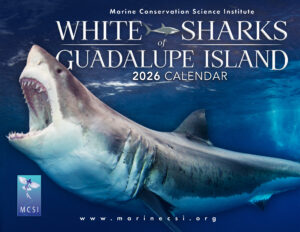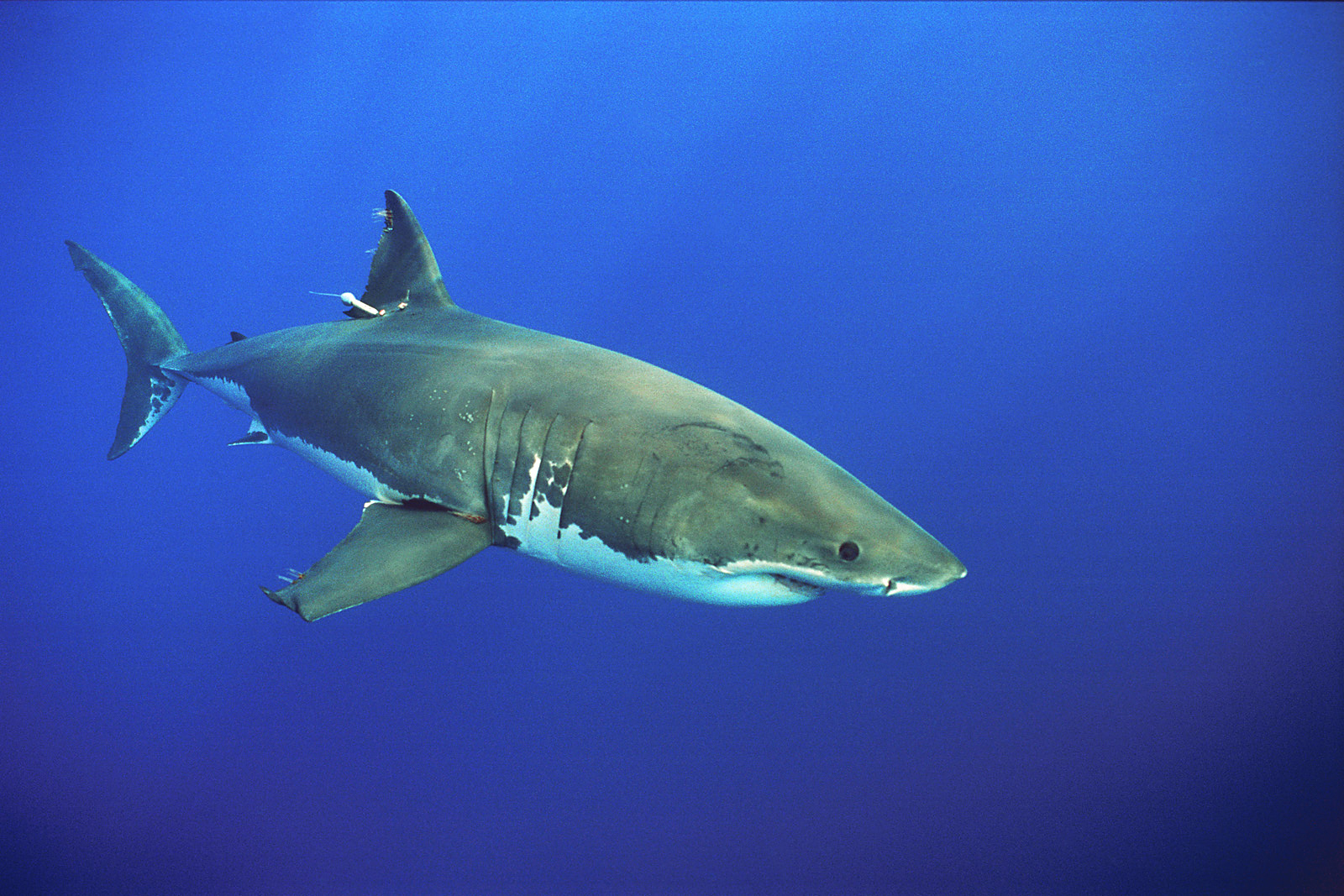Marine CSI
2026 Calendar
White Sharks of Guadalupe Island, Mexico
 This 12-month stunning calendar features a few of our favorite photos of some famous Guadalupe Island white sharks. You get a monthly view of favorite Guadalupe Island white sharks like Bruce, Scarboard, Shredder (AKA Scar and Cal Ripfin), and Lucy! Proceeds support MCSI research and conservation efforts. A must have for all shark lovers! Available at https://www.marinecsi.org/calendar/
This 12-month stunning calendar features a few of our favorite photos of some famous Guadalupe Island white sharks. You get a monthly view of favorite Guadalupe Island white sharks like Bruce, Scarboard, Shredder (AKA Scar and Cal Ripfin), and Lucy! Proceeds support MCSI research and conservation efforts. A must have for all shark lovers! Available at https://www.marinecsi.org/calendar/
2023 Guadalupe Island White Shark Photo-ID Book!
 In case you haven’t heard, Guadalupe Island is still closed for cage diving. We are all very sad to hear this news. It is currently not clear when the island will reopen, but in the meantime, since we are all missing seeing the Guadalupe Island sharks, we printed the updated Guadalupe Island white shark photo-ID book. We had held off printing the updated book in 2022 with the hopes that things would be back to normal in 2023. The last Guadalupe Island white shark Photo-ID guide printed was in 2021 and contained 380 identified sharks. Following the 2021 shark season, the database now has another 74 new sharks to add to that, bringing the total number of sharks in the database to 454. For anyone who named Guadalupe Island white sharks in 2021, they will be in the new book! We plan to print a small batch, so quantities will be limited. Please note that this will be the last printed edition of the Guadalupe Island white shark photo identification guide until Guadalupe Island reopens to the public. Available at https://www.marinecsi.org/sponsor-a-shark/photo-id-book/
In case you haven’t heard, Guadalupe Island is still closed for cage diving. We are all very sad to hear this news. It is currently not clear when the island will reopen, but in the meantime, since we are all missing seeing the Guadalupe Island sharks, we printed the updated Guadalupe Island white shark photo-ID book. We had held off printing the updated book in 2022 with the hopes that things would be back to normal in 2023. The last Guadalupe Island white shark Photo-ID guide printed was in 2021 and contained 380 identified sharks. Following the 2021 shark season, the database now has another 74 new sharks to add to that, bringing the total number of sharks in the database to 454. For anyone who named Guadalupe Island white sharks in 2021, they will be in the new book! We plan to print a small batch, so quantities will be limited. Please note that this will be the last printed edition of the Guadalupe Island white shark photo identification guide until Guadalupe Island reopens to the public. Available at https://www.marinecsi.org/sponsor-a-shark/photo-id-book/
All MCSI T-Shirts 50% off!
 All MCSI t-shirts and sweatshirts are now 50% off! This includes MCSI shark t-shirts, I love Lucy t-shirts, and Rare Hawaiian Great White honey t-shirts and sweatshirts. check out https://www.marinecsi.org/t-shirts-and-hoodies/
All MCSI t-shirts and sweatshirts are now 50% off! This includes MCSI shark t-shirts, I love Lucy t-shirts, and Rare Hawaiian Great White honey t-shirts and sweatshirts. check out https://www.marinecsi.org/t-shirts-and-hoodies/
Meet Mego Mako Shark Freyja!
 Mega Mako Shark Freyja is a mature female mako shark that was satellite tagged by Keith Poe off the coast of Southern California on July 19th. Our satellite tags are attached to the dorsal fin and send real time tracking data via satellite allowing us to track these sharks for anywhere from months to years! This tracking data allows us to better understand the movement patterns of mature female mako sharks. All of this information is important in the management and conservation of this endangered species. You can follow this movement of this shark on the app Expedition White Shark.
Mega Mako Shark Freyja is a mature female mako shark that was satellite tagged by Keith Poe off the coast of Southern California on July 19th. Our satellite tags are attached to the dorsal fin and send real time tracking data via satellite allowing us to track these sharks for anywhere from months to years! This tracking data allows us to better understand the movement patterns of mature female mako sharks. All of this information is important in the management and conservation of this endangered species. You can follow this movement of this shark on the app Expedition White Shark.
Nat Geo SharkFest 2022: Counting Jaws
 Have you been wondering about the number of Great White Sharks off the California coast? If so, you will not want to miss Counting Jaws which highlights the Southern California and Guadalupe Island white shark research of Marine Conservation Science Institute’s Michael Domeier, Nicole Nasby-Lucas and Keith Poe along with our longtime collaborator Dr Oscar Sosa-Nishizaki . We promise you will not be disappointed by this 100% legitimate presentation of real shark science! Available July 12th on Nat Geo, Nat Geo Wild, Nat Geo Mundo, and all Disney platforms, including Disney+, Hulu, ABC, and ESPN.
Have you been wondering about the number of Great White Sharks off the California coast? If so, you will not want to miss Counting Jaws which highlights the Southern California and Guadalupe Island white shark research of Marine Conservation Science Institute’s Michael Domeier, Nicole Nasby-Lucas and Keith Poe along with our longtime collaborator Dr Oscar Sosa-Nishizaki . We promise you will not be disappointed by this 100% legitimate presentation of real shark science! Available July 12th on Nat Geo, Nat Geo Wild, Nat Geo Mundo, and all Disney platforms, including Disney+, Hulu, ABC, and ESPN.
Expedition White Shark app
MCSI has now updated the Expedition White Shark app and it is available for both Android and Apple! This app shows tracks for all of our tagged sharks and provides real time tracking data for white sharks tagged at both Guadalupe Island and central California, as well as large shortfin mako sharks tagged in southern California.
Joshua’s amazing journey
 Joshua, a 15 foot male Guadalupe Island white shark was SPOT tagged in December of 2016. Since then he has made a surprising trek offshore and then up along the coast of northern California and then traveling back down south! You can follow his amazing journey with the app Expedition White Shark! The app is currently available for Apple products.
Joshua, a 15 foot male Guadalupe Island white shark was SPOT tagged in December of 2016. Since then he has made a surprising trek offshore and then up along the coast of northern California and then traveling back down south! You can follow his amazing journey with the app Expedition White Shark! The app is currently available for Apple products.
Gill Rakers’ amazing journey
Guadalupe Island female white shark Gill Rakers was SPOT tagged in December of 2012. Since then she has made an amazing journey up along the coasts of California and Oregon, back offshore and then into the Sea of Cortez during the known pupping season where it is presumed she went to give birth!
New publication reveals the 2-year migration for adult female white sharks in the northeastern Pacific
MCSI develops new methods for tagging adult white sharks
Scientists at MCSI have been working to improve methods for SPOT tagging adult great white sharks. New methods developed, tested and implemented by MCSI involve a device to prevent gut hooking, soft fishing gear to prevent skin abrasions and constant forward movement to fully irrigate the gills. Sharks tagged in this manner, including the largest white shark to ever be SPOT tagged, were far more vigorous upon release than our previous method that lifted the sharks from the water. We strive to constantly improve our methods to do what is best for the sharks and the scientific community.

 The Marine Conservation Science Institute (MCSI) is a non-profit 501(c)(3) organization. MCSI is founded on the belief that focused research can make a difference in how we view and manage our marine resources. We are committed to working towards the goal of sustainable fisheries and a healthy marine environment for future generations to enjoy.
The Marine Conservation Science Institute (MCSI) is a non-profit 501(c)(3) organization. MCSI is founded on the belief that focused research can make a difference in how we view and manage our marine resources. We are committed to working towards the goal of sustainable fisheries and a healthy marine environment for future generations to enjoy.









